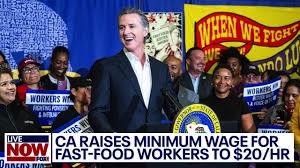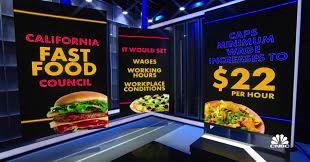 The FAST Act, AB1228 applying to Quick Service Restaurants (QSRs) takes effect on April 1st, 2024. Fast food chains with a designated number of stores will be required to pay workers a minimum wage of $20 per hour with further 3.5 percent annual increases through 2029. Conditions of employment and wage rates would be subject to the decisions of a nine-member Council with equal worker and employer representation.
The FAST Act, AB1228 applying to Quick Service Restaurants (QSRs) takes effect on April 1st, 2024. Fast food chains with a designated number of stores will be required to pay workers a minimum wage of $20 per hour with further 3.5 percent annual increases through 2029. Conditions of employment and wage rates would be subject to the decisions of a nine-member Council with equal worker and employer representation.
Oxford Economics conducted a study that determined that restaurants would have to raise prices by 4 to 5 percent to cover wage increases and that 6,000 workers would lose their jobs with 360 restaurants closing. Quick service restaurants are taking preemptive action by laying off workers, increasing mechanization and in some cases, ceasing operation. The McDonald’s Restaurant Owners Association estimated that wage increases would cost each of the franchises approximately $250,000 annually. Pizza Hut has laid off 1,200 delivery drivers in anticipation of the higher wage rate.
Some economists believe that costs claimed by QSRs are overstated with a study prepared by Michael Reich, a Professor at UC Berkeley and affiliated with the Institute for Research on Labor and Employment maintains that restaurants could cover a 10 percent  increase in wages with a 0.5 percent price increase. Observers noted that many QSRs are already paying between $17 and $20 per hour based on the availability of workers and that AB1228 will not have a material effect on earnings.
increase in wages with a 0.5 percent price increase. Observers noted that many QSRs are already paying between $17 and $20 per hour based on the availability of workers and that AB1228 will not have a material effect on earnings.
Full service restaurants are not covered by the law but if wage rates increase for QSR workers, other categories of restaurants will have to pay more to compete for the available labor pool.